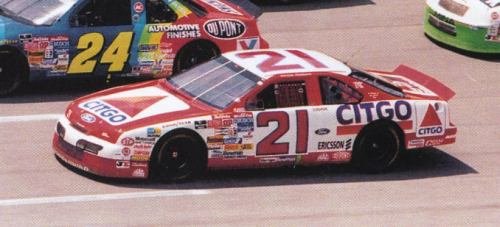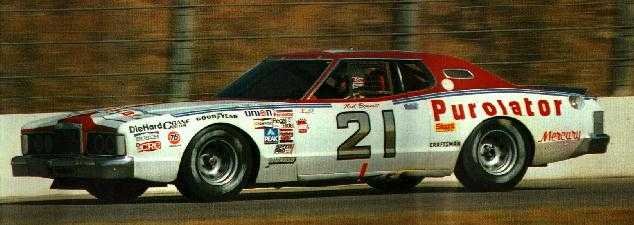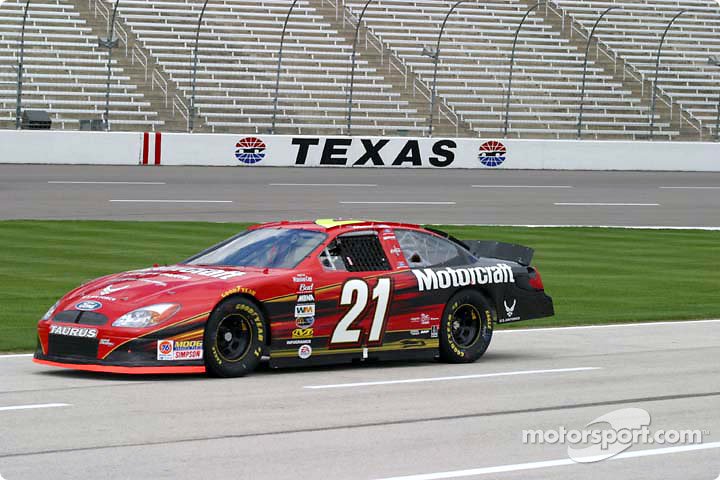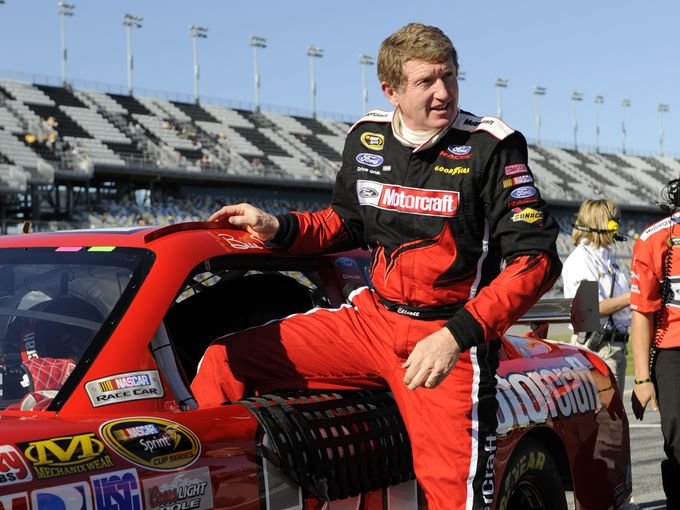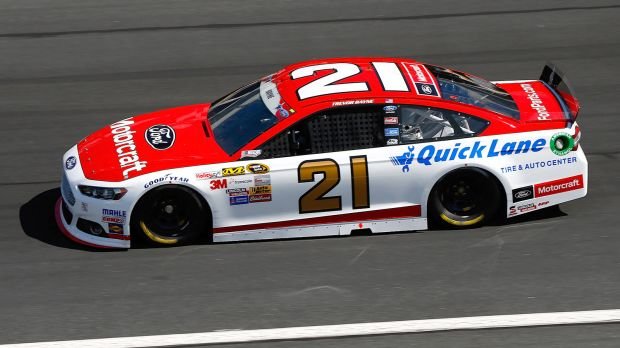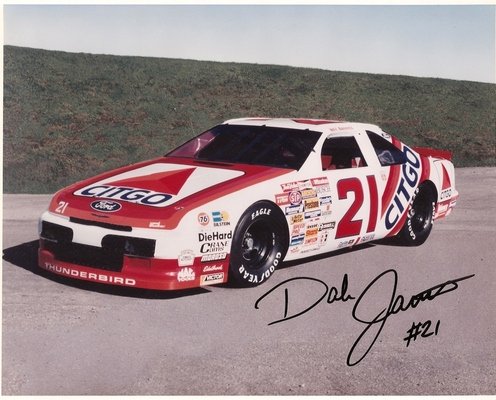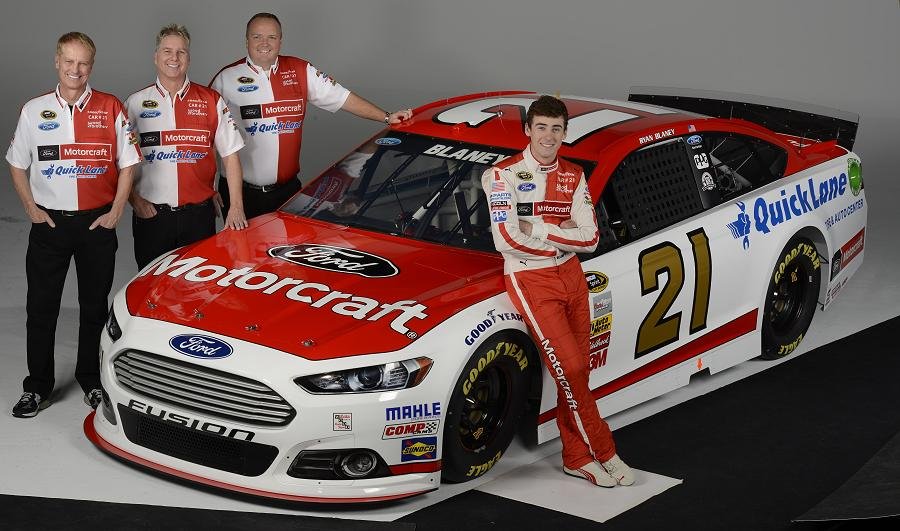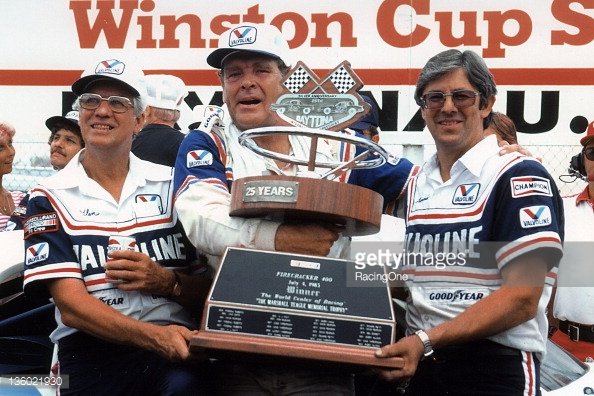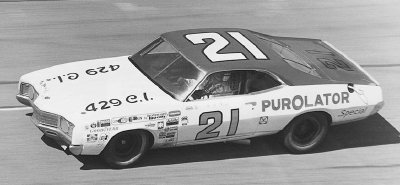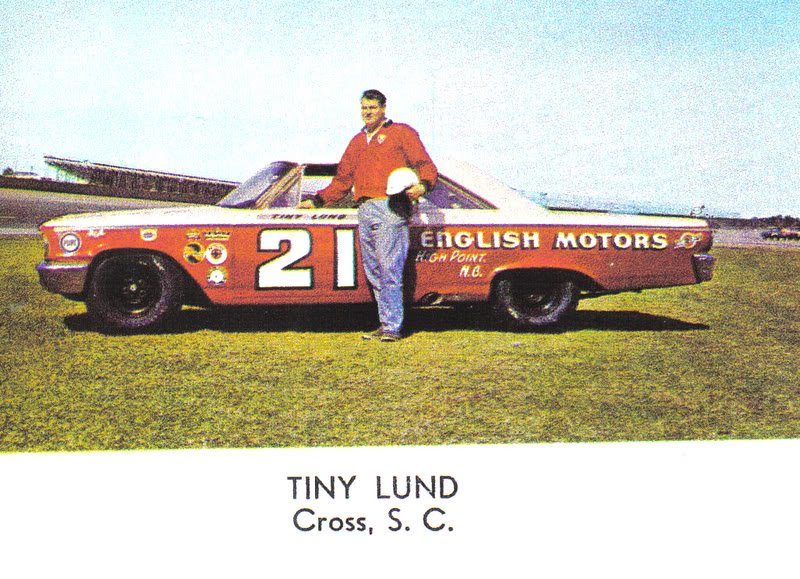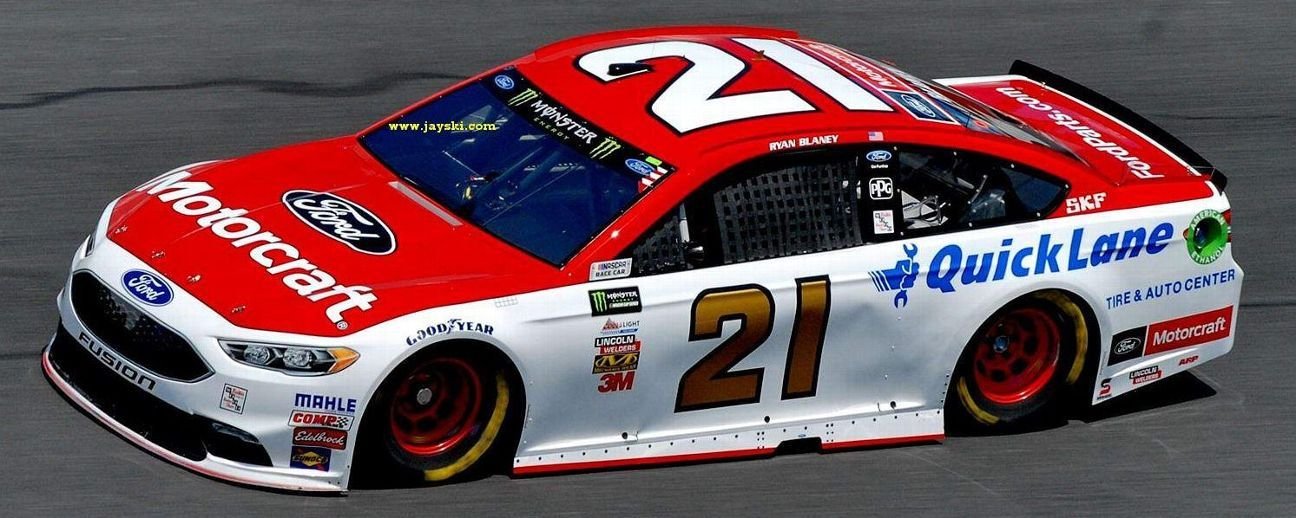
The Wood Brothers Racing Team was formed in 1950 by brothers from the Blue Ridge Mountains of Southwest Virginia. Walter and Ada Wood owned a family farm between Woolwine and Stuart, Virginia. They had five sons (Glen, Leonard, Delano, Clay, and Ray Lee) and one daughter (Crystal). The sons worked with their father as mechanics, farmers, and lumbermen. Glen Wood cut timber and hauled lumber to local sawmills. The boys had a talent for auto mechanics and spent much time at their father’s garage. With each brother serving as a mechanic, they formed a stock car racing team. Curtis Turner, a local sawmill operator from nearby Floyd, Virginia, inspired them. Turner became a champion racecar driver with a “win or crash” style and later was co-owner of Charlotte Motor Speedway. Coincidentally, Turner would later drive for the Wood Brothers.
In the early 1950s, none of the Wood boys wanted to drive, so they asked their friend John Conway, of nearby Stuart, to drive. Unfortunately, he declined the offer. Then they got fellow lumberman, Chris Williams, as their driver. In the early days of stock car racing, teams drove their cars to the track, raced them, and drove them home. Williams and the Wood Brothers bought their first car for $50, inspiring them to number their car No. 50, many years before they adopted their famous #21.
Chris Williams and Glen Wood each drove a few races. The team consisted of Williams, some of his brothers, and the Wood boys. They became successful, winning races at Bowman Gray Stadium in Winston-Salem, NC, and Martinsville Speedway in Martinsville, Virginia.
Shortly after their early success, Chris Williams sold his share of the team to Glen Wood to focus on his lumber business. To fill team slots, the Wood Brothers enlisted help from Stuart area friends and neighbors including Ralph Edwards, a Wood cousin.
Over the early years, the Wood Brothers Racing Team evolved from a weekend hobby into a full-time business. Glen and Leonard worked full-time building and preparing cars, while the other brothers and crew worked nights and weekends apart from their regular jobs. Their first permanent racing shop was at the town limits of Stuart, Va.
The team adopted the No. 21 permanently, and would become as notorious as any number in NASCAR history (along with the Petty No. 43 and Earnhardt #3). The Wood Brothers also found themselves lured to the big-ticket cash prizes offered by the growing Superspeedway races in cities such as Daytona, Fla.; Charlotte, NC ; and Darlington, SC. Glen Wood soon stepped out from behind the wheel of the No. 21 Ford, and they began hiring drivers with reputations as winners at the different tracks.
The team soon began competing on the highest levels of the sport. Victories were won with the mechanical genius of the team of brothers, relatives, and friends. Leonard Wood’s talent in the engine department soon brought the team acclaim and was second in the early years only to the fabled Holman-Moody engine juggernaut and the Petty racing dynasty of Lee Petty and son Richard Petty.
The Wood Brothers invented the modern pit stop. In the early days of all types of motorracing when service was needed during the race, it was common for drivers to pull into the pits, turn off the car, get out and even smoke a cigarette as the crew took their time changing tires and servicing the cars. The Wood Brothers recognized that by limiting the time off the track, it could increase their position on the track. Thus, they created and perfected what is now known as the pit stop. It is now as common to all types of racing as the checkered flag itself.
As other teams noticed that the Wood Brothers were winning races due to their efficient pit stops, these competitors soon copied the Wood method. Not content with being innovators, the Wood team practiced and perfected the pit stop as a form of acrobatic, mechanical, ballet which gave them still further advantage over their competitors.
Other racing organizations noticed the pit stop innovations of the Wood Brothers. In 1965, Ford brought the Wood Brothers team to the Indianapolis 500, to pit the Lotus-Ford team. Their speed and choreography helped Jim Clark win the 1965 500.
In 1998, Glen Wood was named one of NASCAR’s 50 Greatest Drivers. In 1996, he was inducted into the Virginia Sports Hall of Fame. On June 14, 2011, it was announced that Wood would be inducted in the 2012 NASCAR Hall of Fame on January 20, 2012. Leonard Wood is 89 years old and, after battling an illness, Glen Wood passed away on January 18, 2019.
Family members Len and Eddie Wood began working as mechanics in the Wood Brothers shop in the 1970s and worked their way up the through the company. The duo took over full managerial duties in 1999 with the hiring of Elliott Sadler and are still running the company today. In 2020, Wood Brothers Racing celebrated it’s 70th anniversary.
In Cup Series competition the #21 car has started 1,723 races with 82 drivers and has 92 wins, 113 poles, 331 top 5s, and 562 top 10s.
1972-1979 & 1985-1986: David Pearson 157 races, 43 wins
1999-2002: Elliott Sadler 139 races, 1 win
https://www.youtube.com/watch?v=z0ygeH3RB2s&feature=youtu.be&t=7m19s
1992-1995: Morgan Shepherd 121 races, 1 win
https://www.youtube.com/watch?v=J04ylco9WZw&feature=youtu.be&t=2h57m12s
1979-1982 & 1989-1990: Neil Bonnett 114 races, 9 wins
2003-2005: Ricky Rudd 108 races
1996-1998: Michael Waltrip 95 races
1962-1966: Marvin Panch 80 races, 8 wins
1966-1970: Cale Yarborough 77 races, 13 wins
2007-2010: Bill Elliott 64 races
1987-1988: Kyle Petty 58 races
2010-2012: Trevor Bayne 58 races, 1 win
1990-1991: Dale Jarrett 53 races, 1 win
In 2015 Ryan Blaney started the #21 car in 16 races for the Wood Brothers, with support from Penske. He returned to the #21 car in 2016 with the intention of running the full season. Because of NASCAR’s new ‘charter’ rule for 2016, the #21 team was forced to qualify on speed for every race throughout the season. Blaney successfully qualified for all 36 races and quietly had a successful season despite being overshadowed by fellow young-guns Chase Elliott and Kyle Larson. In 2017, The #21 car acquired a charter from Go-FAS Racing, and Blaney earned his first career win by besting Kevin Harvick at Pocono. Blaney started 88 races in #21, but for 2018 he moved to the #12 car for Team Penske.
2006-2007: Ken Schrader 48 races
1958-1961, 1963-1964 Glen Wood 44 races, 1 win
1983-1984: Buddy Baker 42 starts, 1 win
2018-2019: Paul Menard, 72 races
In 2020 Matt Dibenedetto took over driving duties of the Wood Brothers Ford. Matty-D started the season with a 19th place finish at the 2020 Daytona 500, but he rebounded a week later to tie a career-best second place finish at Las Vegas. In the later weeks of the regular season, DiBenedetto battled with seven-time Cup champion Jimmie Johnson and William Byron for the final spots in the playoffs. DiBenedetto would ultimately qualify for his first playoffs when he finished 12th in the regular season finale at Daytona, edging out Johnson for the final seed by six points. He was eliminated following the third race of the opening round at Bristol. DiBenedetto again tied his career-best finish of second the following week later at Las Vegas. DiBenedetto ended his first season with the Wood Brothers 13th in the final standings with 11 top tens.
in 2021, Dibenedetto won a stage at Talladega. He nearly won the race before being passed by Brad Keselowski on the final lap. In 2022, Dibenedetto will be replace by Harrison Burton.
Harrison Burton, 72 starts.
1954: Laird Bruner, 19 races
1958-1961: Curtis Turner 15 races, 1 win
1971: Donnie Allison 11 starts, 1 win
1971-1972: A.J. Foyt 9 races, 4 wins
1963: Tiny Lund 7 races, 1 win
Other notable drivers in #21:
Marcos Ambrose , 5 starts
Speedy Thompson, 5 starts, 2 wins
Junior Johnson, 4 starts
Jon Wood , 4 starts
Harold Kite, 3 starts, 1 win
Tim Flock, 2 starts, 1 win.
Ricky Stenhouse Jr., 1 start
Boris Said, 1 start
During the 1950s and 1960s the Wood Bros. also fielded a #121 car in select events. Most notably Dan Gurny drove the car at the Riverside road course winning 4 out of his 5 attempts between 1964-1969.






